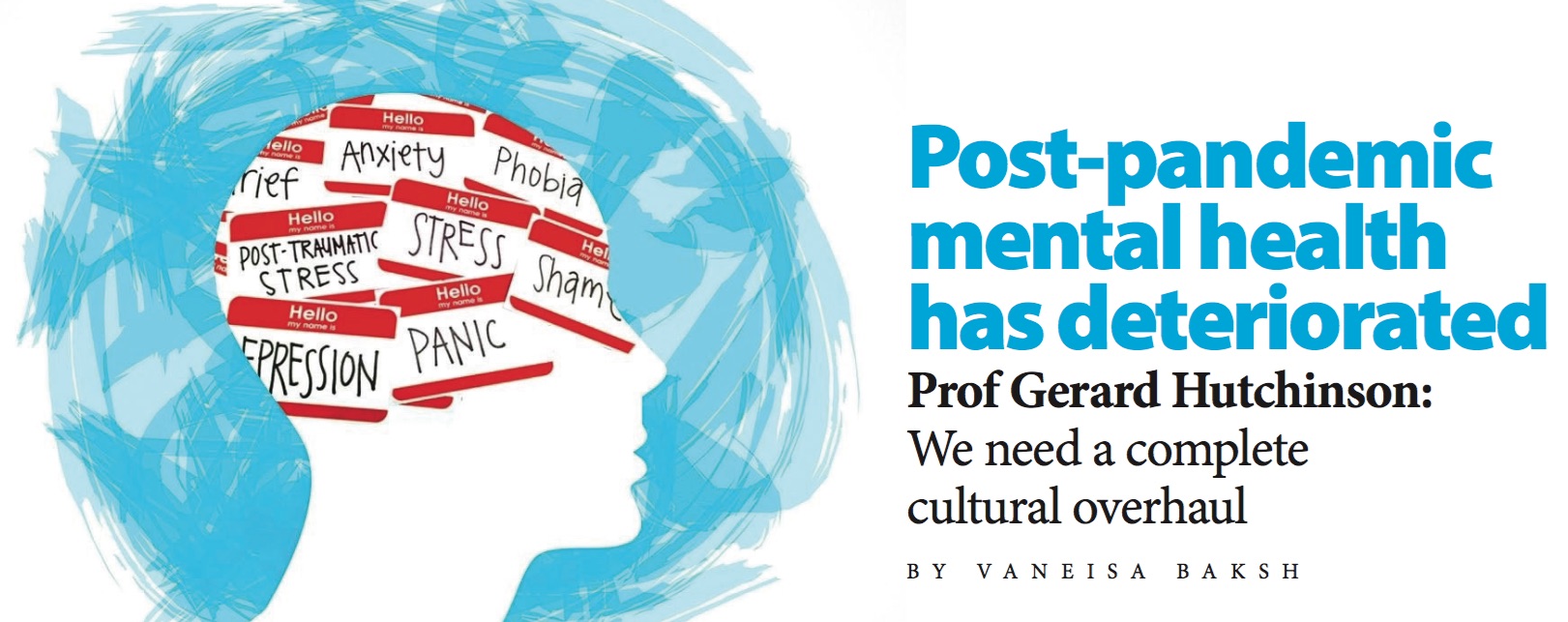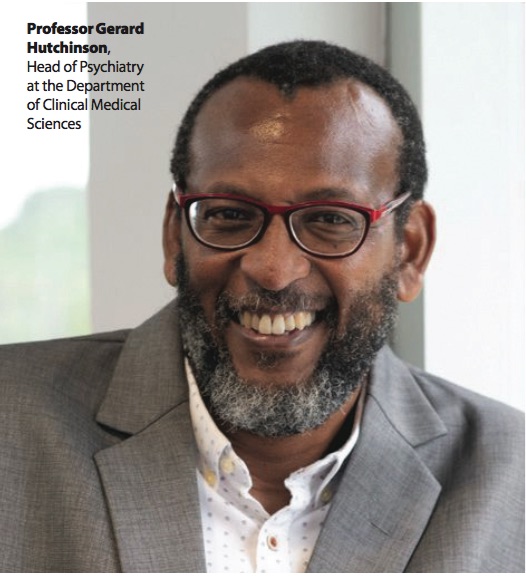
Fourteen years ago, in the August 2009 edition of UWI TODAY, I interviewed Professor Gerard Hutchinson, now Head of Psychiatry at the Department of Clinical Medical Sciences at The UWI, regarding the mental state of Trinidad and Tobago.
We spoke again a few weeks ago, and his analysis of the nature of the society was essentially the same. Little has changed, except that the force of the global pandemic has introduced even more dimensions to the mix.

Back then, he had observed the increase in Borderline Personality Disorders and Attention Deficit Hyperactivity Disorders (ADHD). In the first, patients have strong fears of abandonment and resort to shifting identity based on superficial acts, like how they dress, to be different. It suggests shallowness and instability, he’d said, similar to the traits exhibited by ADHD, which Trinidadians are predisposed to on account of their overactive, impulsive, and inattentive natures.
The society itself presented an unstable framework because of its sheer complexity – if it were a patient, it would be diagnosed with ADHD – and its innate qualities combined with easy access to drugs and guns had met at a point of convergence that had erupted out of control, he’d said.
Worsening violence was a symptom of something deeper, “which is the quintessential Caribbean problem. It’s about identity and belonging,” and the loss of it. “If you don’t feel like you belong somewhere, then there’s no incentive to hold it together.”
The institutional response to escalating crime from the policing, judicial, and health systems lagged behind, not adjusting to the demands on the system from trauma, for instance. People react more excessively to things that happen, he said.
The upsurge in violent crimes had also been recognised. “The perpetrators of the violence feel that they are caught up in something that they can’t control. They feel that they are reacting rather than acting, and I think that, for the most part, they would like a way out, but that way out has to be provided with dignity and pride, because one of the other things that has happened... is that peer respect or community respect or rank has become a much bigger thing than it was.”
The pandemic, with its enforced lockdown amidst a large number of COVID cases and deaths, has pushed people towards extremes.
While he had spoken about the breakdown in trust for public and private institutions pre-COVID, the circumstances of the pandemic exacerbated that mistrust as citizens tried to cope with restrictions and the loss of loved ones.
COVID shone a light, even on the health of the society, he says. Our high death toll was a reflection of the deficiencies in the health system. It was compounded by the prevalence of non-communicable diseases, obesity, and so on; co-morbidities were a big factor.
“We struggled to cope. Our death rates were among the highest per capita in the world. We don’t control eating, drinking, substance abuse, diabetes, high blood pressure, and they’re all connected in a web,” he says. The health system is still lagging behind. Even if you are diagnosed with ADHD, where is the treatment?
There are more people with depression, sometimes submerged depression, much of who are young people, he says, and there is a sense of hopelessness. They don’t see opportunities. They look around and see that the likelihood of success is pretty low.
They recognise their despair; sometimes they seek help indirectly through self-harm, or attempted suicides. Managing behaviour is the key to improving our health system, and by extension, our mental health, he says. This period, since COVID, is a transitional phase, and it is manifested by several factors. Identity, for instance – definitions of sexuality, gender fluidity, ethnic and racial communities – is one of the things that we are trying to come to terms with. We like to follow metropolitan movements. He thinks we have made strides socially, because we are ahead of the curve in the Caribbean.
The education system continues to come up short. Nearly half of the children who took part in the SEA exams a couple years ago scored less than 50 percent of the total. Many will not get through secondary school because they don’t have support systems. They are condemned to lives as KFC workers, CEPEP workers, and even lives of crime, he said. These are all factors affecting the mental wellbeing of the society. People react, often with hostility, to situations they don’t understand.
Even the influx of Venezuelans has triggered xenophobic responses. Yet, they are not averse to exploiting the situation. He describes a visit to Moruga, where close to the police station, a fisherman invited him to hop across to Venezuela for the afternoon. You can bring anything back, he was told. And by anything, he means anything, including people, he says. The police post nearby was of no consequence.
To change any one thing requires that you have to change everything. “I think people recognise that, but are they willing to give up what they have to effect that change?” Rather than address crime at its various roots, people prefer to hire security companies. Big corporations recognise that providing security is big business. They feed on the fear.
He thinks there has to be a complete overhaul of the culture of the place.
“We’re naturally hedonistic. The hedonism, the short attention span, the impulsivity, the selfishness: the inclinations are there.” As with ADHD, there is no support. At least in other societies, the imposition of rigour forces a management strategy. But here, everything goes. “We’re cavalier, and that is a Trinidadian thing.”
We have to create new models of aspiration because the models we have now are empty, he says.
Art, in all its manifestations, is one of the things that will bring salvation – allowing people to recognise we all have a creative impulse, and we have to allow it to express itself to bring us together.
“Even with all the hedonism, we are an endlessly creative people. We continue to see art as something to do on the side, but I think we have to use who we are and what we are as vehicles to get us out of the state we are in.”
Here is the link to the August 2009 interview: https://sta.uwi.edu/uwitoday/archive/august_2009/article1.asp.